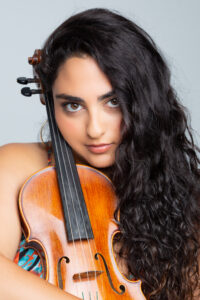• Up Close & Musical • Marin Symphony Orchestra • Honor a Chair
Ani Bukujian, Concertmaster
Chair Endowment: The Catherine Munson Chair
Bio:
Appointed June 2023
It is with great pleasure that we announce the appointment of Ani Bukujian, an esteemed alumna of Juilliard and San Francisco Conservatory, as the new Concertmaster for the Marin Symphony. Her selection marks a significant milestone in the orchestra’s 70+ year history, as Ani becomes only the third violinist to hold this esteemed position, following in the footsteps of Jeremy Constant who stepped down in 2022.
Ani Bukujian was born into a musical family and started playing the violin at two and a half years old. When her grandmother gifted her with a toy violin, she would stand in front of the television while imitating famous violinists, such as Sarah Chang and Itzhak Perlman. Ani studied with her father exclusively until the age of 15. A native of Los Angeles, she won numerous musical competitions, including three gold medals at the World Championship of Performing Arts, first place at the Bach Competition, the ASTA Annual National Solo Competition, and the Pasadena String Festival. At the age of 7, she was a solo performer in her debut concert with a chamber orchestra at the Alex Theatre in California. Ani was also part of the Viva-Vivaldi All-Girl Orchestra in Washington, DC, being the youngest 1st violin in the orchestra. At the age of 8, she was asked to perform a solo piece with the Bakersfield Symphony, where she played one of Vivaldi’s Four Seasons (Summer). As an AGBU scholarship recipient, she performed at Weill Recital Hall in her freshman year at The Juilliard School in 2012.
She has recently performed as a member of the Charleston Symphony Orchestra. She has served as Concertmistress in the Miami Summer Music Festival, where she played the solo of Richard Strauss’ Also Sprach Zarathustra. She has also participated in other festivals, such as Bowdoin Music Festival and Fontainebleau Festival in France. She has performed in venues such as David Geffen Hall, Alice Tully Hall, Carnegie’s Stern, Zankel, and Weill Hall as a chamber and orchestral musician as well as a solo performer. Ani has collaborated with distinguished artists such as Kim Kashkashian, Ian Swensen, and Dimitri Murrath and participated in masterclasses with teachers including Andres Cardenes, Aaron Rosand, Ruggiero Ricci, Abraham Shtern, Gerard Poulet, Dmitry Berlinsky, Ida Haendel and Pamela Frank among others. She holds both Bachelor’s and Master’s Degrees from The Juilliard School, where she studied with Lewis Kaplan and Laurie Smukler.
After moving from New York to San Francisco, she attended the San Francisco Conservatory, where she studied with the concertmaster of the San Francisco Symphony, Alexander Barantschik. Ani is now the Principal Second Violinist of the San Francisco Ballet Orchestra.
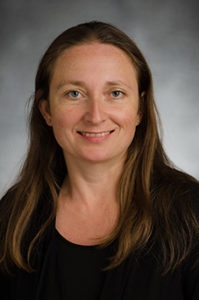
Emanuela Nikiforova, Violin I
interview by Jeff vom Saal
I have lived in the Bay area since 2000. I played as a substitute for a year under Gary Sheldon, then as a Marin Symphony member since 2002.
My parents, recognizing my musical ability, took me at the age of four to a prominent piano teacher who, after testing my musical ear and looking at my parents’ physique (size of palms and fingers) suggested that I play the violin! I was pretty content with that from the very beginning, although I enjoyed a lot learning some piano skills later in life.
My favorite composers are many, but Bach, Prokofiev, Brahms are top of the list. Also the Bulgarian composers Pancho Vladigerov and Marin Goleminov.
An amusing symphony moment was Zach Spellman’s (Principal Tuba) rap for Carole Klein’s (Principal Trumpet) retirement, that was hilarious and extremely special! There have been many great inspirational moments, one of which accompanying Leila Josefowicz, playing the Shostakovich concerto no. 1 with the Marin Symphony. She kept us all on the edge of our seats!
In addition to music, I enjoy yoga, eclectic food (chocolate!), the outdoors, spending time with friends and family. If I were not a musician, I would be a yoga instructor, or something in drama or psychology.
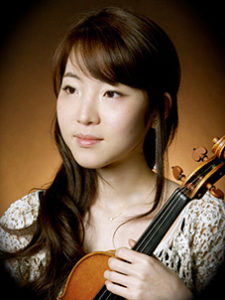
Jiwon Evelyn Kwark, Violin II, Assistant Principal
interview by Jeff vom Saal
I have lived in the Bay Area and played with Marin Symphony since 2014, but I love the city so much that I would like to stay here forever!
My students, colleagues, and friends have a hard time believing this, given how much I love performing, sharing music, and conversing with them: but when I was little, I rarely spoke in school because I was so shy. My mom saw this as an opportunity and thought that finding an instrument would be a good outlet to express myself to become more outgoing and confident. It just goes to show that “mother is always right” because, even now, I can’t believe how timid I used to be!
My favorite composer list list changes quite frequently because I try to fully immerse myself in the current pieces I work on, which in turn increases my appreciation and love for the composer. But I have to admit, playing Brahms takes my breath away and tugs at my heartstrings every time!
I love a good walk. I moved back to California after finishing my studies in NYC, so I fully appreciate the beautiful sceneries and weather of San Francisco. I also love watching movies, cooking/eating a good meal, and reading books. Oh! and I can’t forget to include talking with my mom about everything and anything everyday because I’m a total mommy’s girl.
Do you know how some of our worse moments turn into fun memories to reminisce with our friends? Well, I was terrified from all the flies swarming around the stage lights during our outdoor Pops concert in the summer. Actually, there was a fly that truly must have wanted to become a musical note on our sheet music because it flew onto our music and walked around everywhere! But now, I laugh about it with my colleagues!
I visited Korea a few summers ago to visit my relatives. Since my family has been in the U.S. for many years, my grandfather (who was in an assisted senior health care center with cancer and amnesia) had forgotten about my siblings and me. Even after the daily visits we made, he had a hard time remembering us each day. Then one day, my siblings and I decided to put on a concert for him and his friends at the center. My younger brother at the piano, my younger sister and me on the violin. I still remember clearly the look of pure joy and happiness on my grandfather’s face. After the concert, he never forgot us, and would ask about how each of us were doing. He would even inquire about my musical endeavor each time we spoke on the phone. He wasn’t much of a classical music enthusiast, but I know he fell in love with classical music that day. Thanks to my grandpa, I know music is pure magic! I hold this magical memory dear to my heart and I try to play each and every concert as sincerely and passionately as I had played for my grandfather that one special, summer day in Korea.
If I were not a musician, I would have been an elementary or middle school teacher, because I love interacting with kids so much. Seeing my students grow as a musician and a young adult, in addition to seeing them appreciating and loving music with each lesson gives me great joy and energy. I have been blessed with meeting and learning from the greatest teachers. They have helped shape me to who I am today – I hope to be the same to all my students!
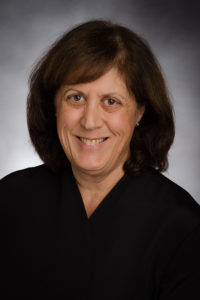
Renee Froman, Violin II
Season Chair Sponsor: Frank & Lee Battat
Board Member
interview by Jeff vom Saal
I’ve lived in the Bay Area for 50 years and played in Marin Symphony 32 years. I started playing the violin because there were two violins in the house. My mother had been a student of Hugo Rinaldi’s. Beethoven, Prokofiev, Brahms are favorite composers of mine. During free time, I spend it with my family – three adult children and one grandchild. I also enjoy Japanese Brush Painting. A special musical memory for me is playing with Orchestra Piccola (part of MYSO) at the Spoleto Festival in Italy.
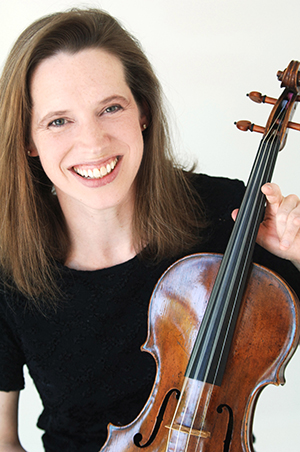
Jenny Douglass, Principal Viola
Season Chair Sponsor: Steven & Sally Schroeder
Chair Endowment: The Elsie Rigney Carr Chair
Jenny in conversation with Alasdair, with performance
Bio:
Jenny began her musical life at age four as a Suzuki violinist in Chapel Hill, NC. She was introduced to the viola at age thirteen during a summer music camp in the Berkshires and has never looked back. She earned degrees from the Oberlin Conservatory of Music and the Juilliard School. She is grateful to have studied with extraordinary teachers: Eugene Lehner, Louis Krasner, Felix Galimir, Robert Mann, Leon Fleisher, Lynne Ramsey, and Karen Tuttle.
Since 1999, Jenny has been the Principal Violist of the Marin Symphony, where she has appeared as featured soloist in Walton’s Viola Concerto, Bruch’s Double Concerto for Clarinet and Viola with Richard Stoltzman, and Mozart’s Sinfonia Concertante with Jeremy Constant. Ms. Douglass is also a frequent substitute with the San Francisco Symphony. She joined the New Century Chamber Orchestra in 2010, and was featured alongside Nadja Salerno-Sonnenberg in Lera Auerbach’s Sogno di Stabat Mater. She has been a regular performer with the NYC-based Orpheus Chamber Orchestra since 1992.
Jenny enjoys the challenge of balancing a busy concert schedule with an active family life. She lives in Mill Valley, CA with her husband and two sons, ages 14 and 16. She can usually be found chauffeuring, cooking, or cheering at her sons’ baseball games.
Interview: With Concertmaster, Jeremy Constant, for Masterworks 2, 2020
How did you get started with your instrument?
Jeremy: According to my parents, when I was six, I asked for violin lessons. They found a local violin teacher who said, “Six is too young—get him piano lessons for the first year.” I played both piano and violin all through school until I went to Juilliard. By that time, I had played violin in orchestras and I knew that was what I wanted to do. I was just astonished that I could be part of this huge sound, with that great repertoire.
Jenny: I started violin when I was four in a Suzuki program. I kept going with violin and started playing in youth orchestras, and it became more and more fun. I switched to viola the summer before 9th grade at a summer music camp. There were no violas there that year. It was raining, and my violin teacher said, “I will give you a violin lesson outside, or a viola lesson inside.” Basically, they needed someone to play viola that summer and I got picked. I never looked back. The viola is way better than the violin! We get all the juicy harmonies.
What do you like about playing with the Marin Symphony?
Jeremy: My first orchestra was mixed professionals and non-professionals. It served the community and had room for a young violinist, just starting out on a potential career. When I started with the Marin Symphony, it was very much like that. Over the years it has progressed and improved and become part of the fabric of professional Bay Area musical life. It has elevated itself to where it’s just about the enjoyment of playing great music with great players.
Jenny: For one thing, the longevity of the people here. I think the average tenure of a Marin Symphony musician is about 25-30 years. The orchestra has had so many of the same people for so long that it’s incredibly familiar. Alasdair has taken the orchestra to completely new levels since I joined it in 1999, and the concerts just get better and better. Jeremy and Alasdair and I joined the orchestra one year apart. You can’t measure what that means for the trust and unspoken communications that happen onstage.
You will be playing Mozart’s Sinfonia Concertante together. Do you think your personal friendship will enhance the performance?
Jeremy: It is helpful if you both have the same approach to the music, and Jenny and I work well together. The piece is very joyful. We have fun when we’re playing together, and I think that translates into the body of the music.
Jenny: It’s definitely to our benefit that we are friends. There is an automatic agreement, because we know each other’s playing so well. The whole piece is a dialogue, so to play this piece with Jeremy, a dear long-term friend, is so comfortable. It will feel like we’re having a conversation onstage.
Do you have any unusual hobbies?
Jeremy: I spent seven years building Stella, an experimental Vans RV7A two-seater airplane. I finished it in 2010, and have been flying it ever since.
Jenny: I cannot beat building an airplane, but my hobby is also unusual—attending baseball games that my two sons are playing in. I go to approximately 100 baseball games a year.
If your instrument could talk to you, what would it say?
Jeremy: In a way, it already has. I play on a San Francisco-owned Stradivarius, and as I was first learning how to play it, it was learning how I wanted it to respond. They have their own personalities. There are occasions when it basically says, “Nope, not today.”
Jenny: I think it would say, “I’m glad you appreciate me.” Jeremy and I both play on very old instruments. They were both made in Cremona [Italy] around the same time, so we have had fun thinking that these instruments might have played together before.
Jeremy, what kind of superhero power do you think would suit Jenny?
Jeremy: A character in one of the Harry Potter books is given a little magical watch that makes her able to dial back and control time. I think Jenny would like that.
Jenny, what kind of super power do you think would suit Jeremy?
Jenny: Jeremy would fly for sure. He would be a flying superhero.
What kind of music do you like to listen to in your off time?
Jeremy: I built the airplane to classic rock—Santana, Eagles, Led Zeppelin, and the Beatles. That’s the music I go to when I don’t have to learn or review something.
Jenny: I listen to the kind of stuff I have listened to since college—Joni Mitchell, Ricki Lee Jones, and Ella Fitzgerald. I don’t listen to current radio.
Do you have a favorite composer?
Jeremy: My favorite composer would be anyone I haven’t played too much of recently. I will always go back to Bach, but if I listen to too much Bach, I need a break and have to listen to somebody else. It’s always going to be someone who has stood the test of time.
Jenny: It depends on the day. Last night I heard Yo-Yo Ma play all of Bach’s cello suites, so today I am thinking about Bach nonstop. And Mozart is just amazing. I think I would rotate my favorite composer between Bach, Mozart, and Brahms.
Why do you think music is so important?
Jeremy: Music has the ability to catch you completely off guard, because it bypasses all of the rational parts of the brain. It’s a bit like a smell that can take you immediately back to a certain place. There is absolutely something universal about music.
Jenny: Music brings people together. It communicates outside of language and transcends all the daily stuff. It’s bigger than talking and writing and reading—it creates feelings.
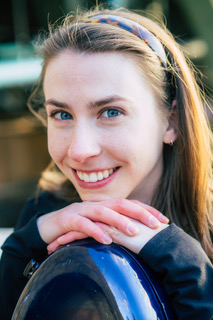
Madeleine Tucker, Principal Cello
Madeleine in conversation with Alasdair
Madeleine in performance
Madeleine Tucker is now in her second season as principal cellist with the Marin Symphony. Passionate about both math and music, she earned a degree in Applied Mathematics from Columbia University and a Master of Music in Cello Performance at The Julliard School. While still in school, she founded a cello ensemble called String Theory, that performed all over the country in a variety of genres, including classical, pop, jazz, electronic and more.
What do you like about playing with Marin Symphony?
The Marin Symphony is a group of spectacular human beings. The repertoire we play is the perfect mix of new and traditional. The people, both the musicians and the administration, are welcoming, genuine, and talented, and it’s such a pleasure to work with our music director Alasdair.
How did you come to play the cello—did you try any other instruments?
I started piano when I was three, and I really liked it. My sister played the violin, so she got to play chamber music with other string players, and I really wanted to do that too. So I chose the cello [at age seven] and I really enjoyed it, so I switched.
How often and for how long do you practice?
I practice between one and three hours every day. Once you get out of shape, it’s really hard to get back in shape, and I don’t want to lose it.
If you could choose another instrument to play, what would it be?
Oboe. I begged my mom to let me rent an oboe for a week when I was little. It came with a plastic reed and I sounded like a duck. That was the end of my oboe career.
What are the challenges and the joys of playing music professionally?
When you are learning a lot of repertoire all at the same time, it’s hard to fully enlist yourself in one specific artist or one specific piece and to digest the repertoire all at the same time. But what I like is that there’s so much repertoire that I’ll probably never play everything, so there will always be something new.
Do you have any hobbies or special interests?
I like to exercise a lot—running, biking and swimming, and listening to audio books, making cards, puns, and learning about new fraud schemes.
If you could travel to anyplace in the world, where would it be?
Japan is at the top of my list. I studied Japanese for six years in high school and college and have never gone! I also want to visit more parts of the U.S., so perhaps a cross-country road trip.
What kind of music do you like to listen to? Any favorite artists?
If I want to be in a lighthearted mood I’ll listen to my favorite funk band, Vulfpeck. If I’m feeling athletically inspired, I’ll turn on some electronic dance music. If I’m just feeling moody, I’ll go for either Brahms or Radiohead.
What do you think your pet would say about you?
I just have some succulents—that’s the closest I have. They would say, “Please water me more!”
Tell me something about yourself that would surprise most people.
I have a fantasy pet. Someday I’m going to get a hamster, and its name will be Echinacea. I heard that you can train rodents like you can cats and dogs, and I would like to try and train it to push little balls around and walk through hoops.
How do you stay calm during a performance?
Sometimes it’s tough to stay calm during a performance, but over the years I’ve learned to just think about trying to make a single phrase as beautiful as I can. That gets me out of the mindset of being scrutinized, to the mindset of just playing the most beautiful music I can.
What do you think music does for people? Why is it important?
Music brings people together who wouldn’t normally have the circumstances to connect.
What are you most grateful for in your life?
That the Marin Symphony accepted me to play the cello with them! Also family, friends, and all the little things that make us all human.
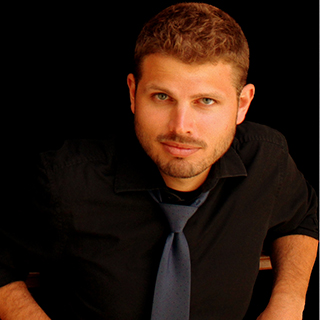
Robert Ashley, Principal Bass
Season Chair Sponsor: Nancy Thelen Rehkopf
Robert Ryan Ashley, the Principal Bassist with the Marin Symphony since 2009, is in demand. He commutes all over the Bay Area to perform with a number of orchestras, including the Silicon Valley Symphony, the Berkeley Symphony, and the Napa Valley Symphony. He also teaches bass at UC Santa Cruz. Originally enamored of jazz, after spending a couple of summers at the Tanglewood Music Center in Lenox, Massachusetts, Ashley decided to seriously pursue classical music instead.
Did you ever play any instrument besides double bass?
My very first instrument was piano when I was five, and then I started playing violin in 4th grade. In 5th grade they let you pick violin or cello, so I played cello in the school orchestra. But there was a kid who played electric bass, and I just thought that was the coolest thing in the world, so that summer I asked for an electric bass for my birthday and I got one. I started taking electric bass lessons and I absolutely loved it — I couldn’t put it down, and in seventh grade I was playing acoustic bass and electric bass in the school orchestra. It wasn’t until 10th grade that I started taking double bass lessons.
What was it about the bass that grabbed you?
I always liked low frequencies. If there were something bigger and lower, I probably would have picked that.
What do you like about playing in an orchestra?
There’s just something about playing in an orchestra — it feels like being on a team. Growing up, when I played sports, I wanted to play defense or goalie or one of those support positions. I didn’t want to be scoring the goals; I wanted to be protecting home base. I feel like playing bass is a similar position within the orchestra — the bass player is kind of like the defender.
Do you have a favorite composer?
I always love playing Brahms. He really utilizes the bass in a way that not many composers do. The way he orchestrates, the bass is very present and melodic — powerful and aggressive at moments, and highly romantic and singing at other moments.
I also love playing Stravinsky. He is just amazing. He came out of nowhere with these incredible parts and this willingness to create something that was entirely his own. He abandoned so much tradition at the time, and was very willing to embrace dissonance.
What do you like to do besides playing music?
I have a sailboat together with a group of friends — the Nalani, a 20-foot catamaran, which is docked in Emeryville. We sail mostly over the summer because that’s when people have time after work.
When you are not practicing and performing, what kind of music do you like to listen to?
I don’t listen to a whole lot of music in my spare time, because the rest of my life is just music, music, music, and I don’t get time to read because of that. So the last couple of years, I have been doing Audible — I have just been inhaling audio books in my car, when I am commuting. I love popular science — quantum mechanics, string theory, artificial intelligence, and biology.
If you had to choose another career, what would it have been?
Everyone tells me I would have been an engineer; I am always fixing and building stuff. This year I started building my first bass from a mixture of carbon fiber and a material called Ekoa, which is a natural flax fiber. I just finished it, and it has a wood veneer so you can’t tell it is made from composites. I am hoping to make this a secondary career or side business so I can take fewer gigs and not have to drive so much. For the price point, these instruments will look far more beautiful than anything else you could get in the same range
What do you like about playing with the Marin Symphony?
I love Alasdair — he’s my absolute favorite conductor to work with. He’s the best combination of musicality, clarity, competence, kindness, and understanding. I always feel like I can ask him anything, anytime. He is a genuinely kind and caring human being.
Are you happy with your life as a professional musician?
I am 34 and teaching at a university, getting to play with lots of great groups, sailing a lot, and building instruments. I feel like I hit the target.

